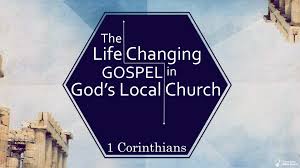 For this reason I bow my knees before the Father, from whom every family in heaven and on earth is named, that according to the riches of his glory he may grant you to be strengthened with power through his Spirit in your inner being, so that Christ may dwell in your hearts through faith
For this reason I bow my knees before the Father, from whom every family in heaven and on earth is named, that according to the riches of his glory he may grant you to be strengthened with power through his Spirit in your inner being, so that Christ may dwell in your hearts through faith
— Ephesians 3:14–17 —
When I preached through Paul’s prayers a few years ago, I read D.A. Carson’s A Call for Spiritual Reformation: Priorities from Paul and His Prayers. In that book, Carson recounts how we should think about Paul praying for the “inner man” (Ephesians 3:16). That section struck a deep nerve with me, and as I prepare to preach that passage this Sunday, I share it with you.
Most of us in the West have not suffered great persecution, but all of us are getting older. In fact, sometimes we can see in elderly folk something of the process that Paul has in mind. We all know senior saints who, as their physical strength is reduced, nevertheless become more and more steadfast and radiant. Their memories may be fading; their arthritis may be nearly unbearable; their ventures beyond their small rooms or apartments may be severely curtailed. But somehow they live as if they already have one foot in heaven. As their outer being weakens, their inner being runs from strength to strength. Conversely, we know elderly folk who, so far as we can tell, are not suffering from any serious organic decay, yet as old age weighs down on them they nevertheless become more and more bitter, caustic, demanding, spiteful, and introverted. It is almost as if the civilizing restraints imposed on them by cultural expectations are no longer adequate. In their youth, they had sufficient physical stamina to keep their inner being somewhat capped. Now, with reserves of energy diminishing, what they really are in heir inner being is comin out.
Even for those of us who are still some distance from being senior citizens, the restrictions and increasing limitations of the outer being make themselves felt. My body is not what it was twenty years ago. Every time I take a shower, a few more hairs disappear down the drain never to be seen again. I have arthritis in two or three joints; I have to watch my intake of calories; my reaction times are a little slower than they used to be; in a couple years I shall need reading glasses. And someday, if this old world lasts long enough, I should waste away, and my outer man will be laid to rest in a hole 6 feet deep. Yet inwardly, Hall insists, in the inner man, we Christians are being “renewed day by day.”
The Christians ultimate hope is for the resurrection body. But until we receive that gift, it is our inner being that is being strengthened by God’s power. In a culture where so many people are desperate for good health, but not demonstrably hungry for the transformation of the inner being, Christians are in urgent need of following Paul’s example and praying for displays of God’s Mighty power in the domain of our being that controls our character and prepares us for heaven. (184–85)
Few reflections on prayer or the spiritual life have arrested my attention like these words. Why? Because as a man still young in ministry and relatively young in my Christian walk (compared to those who have walked with Christ for 30, 40, an 80 years), I wonder, “Is my outward maturity more a mark of spiritual strength or a good memory? Do I obey the commands of God because faith motivates love, or because disobedience would impugn my reputation?” Continue reading →
 In John 1:35–51 we move from John the Baptist’s testimony about Jesus to Jesus’s own testimony. Here are ten things we find about Jesus in those verses.
In John 1:35–51 we move from John the Baptist’s testimony about Jesus to Jesus’s own testimony. Here are ten things we find about Jesus in those verses. “The Lord has established his throne in the heavens,
“The Lord has established his throne in the heavens, For this reason I bow my knees before the Father,
For this reason I bow my knees before the Father,


